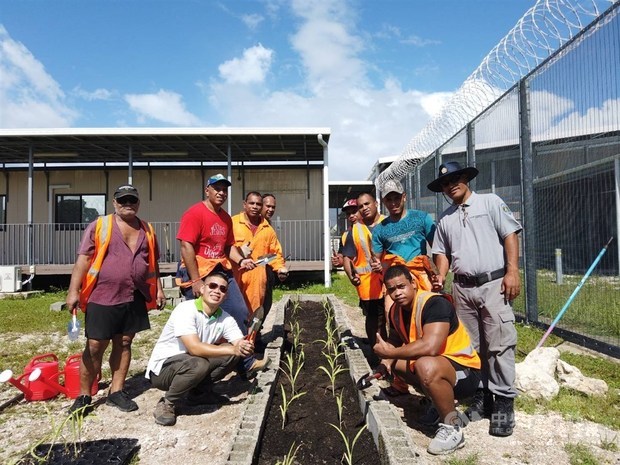
Taipei, May 31 (CNA) A Taiwanese technical mission in the Pacific island nation of Nauru is helping a local penal facility cultivate a piece of land to improve food self-reliance and ensure inmates learn skills they can use after being released, according to the mission.
"The project, under the concept of waste minimization, officially started in January, with a poultry and pig farming section to be completed in August," Daniel Lee, chief of the Taiwanese technical mission told CNA in a telephone interview Sunday.
Capacity building for crop planting, livestock raising, fertilizer making, and cooking skills will start in June with the goal being to transfer the farm to the Nauru government at the end of 2020 or early 2021, Lee added.
Nauru is one of 15 countries that maintain diplomatic relations with Taiwan.
The pilot penal farm in the Topside area, was initiated by Nauru President Lionel Rouwen Aingimea and Taiwan's International Cooperation and Development Fund (ICDF), which organized the technical mission, according to an earlier press statement by the ICDF.
Aingimea personally requested assistance from Taiwan to start the project through Taiwan Ambassador Dean Wang in 2019, with the prison seeking to achieve 80 percent food self-sufficiency as all inmate food is currently imported, the ICDF said.
Jo Chan, a horticultural specialist with the technical mission, said that contrary to public perception, it is not dangerous working with inmates because participants are selected for their good behavior.
"In addition, jail guards are always on site to monitor the situation," Chan added.
He, did however admit that there were some worries before meeting the inmates.
"But after interacting we found them to be very friendly and cordial. Perhaps it was because they knew we were there to help them," Chan said.
Asked to share one amusing anecdote working with the inmates, Chan recalled that he once asked them what crop they would like to learn to grow, and one inmate answered mango trees.
"It takes three to four years for a mango tree to bear fruit. Do you want to stay in prison that long? I said in jest as the inmate shook his head wildly to the laughter of everyone in the farm," Chan said.
One of the most difficult situations the team encountered was digging garden beds because the farm is located on top of solid bedrock, but the inmates did not complain despite the blisters and calluses on their hands, he said.
Another challenge they faced was the extreme heat. It affected the growth of crops, but the team solved that problem by building shading-nets to lessen the direct exposure of plants to sunlight, Chan said.
Members of the technical mission have been concentrating on problem-solving and looking for innovative ways to increase efficiency, according to Pedro He (何祈龍), a livestock specialist.
The technical mission will teach the inmates how to prepare nutritious and balanced meals, including Taiwanese dishes, after more crops and vegetables are harvested, along with hogs and chickens, said nutrition specialist James Yu.
"We hope the inmates can start a new life with the agricultural skills they learn after their rehabilitation and at the same time help increase food security in Nauru amid the COVID-19 pandemic and climate change," the technical mission said.